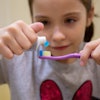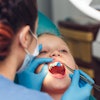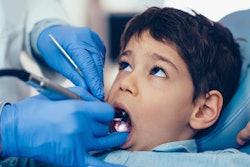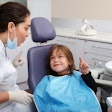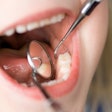
High birth weight may serve as a predictor for early childhood tooth decay and should be factored into risk assessments to prevent caries, according to a birth cohort study published in BMC Oral Health.
Furthermore, a birth weight of 4,000 g (8.8 lb) or more was associated with a higher risk of caries in toddlers, the authors wrote.
"It may be essential to pay more attention to children with high birth weight in an effort to prevent dental caries," wrote the authors, led by Huning Wang of the Shanghai Stomatological Hospital & School of Stomatology in China.
Early childhood caries (ECC) is defined as the presence of one or more decayed, missing due to caries, and filled tooth (DMFT) surfaces in any primary tooth in a child age 71 months or younger. Recent data show a wide variation in ECC prevalence globally, ranging from 23% to 90%. ECC is one of the most common chronic childhood diseases worldwide, they wrote.
This study included 491 children, ages 4 to 5. The study was designed as a retrospective longitudinal register-based cohort study, using information from Xinhua Hospital, including clinical examinations and questionnaires. Pregnant women in their first trimester were recruited for the study between June 2012 and March 2013.
The cohort was followed until the children were 4 or 5 years old. During this period, the children underwent regular physical examinations, including oral checkups, but they did not receive any treatment from the local municipality for six months. Their caries experience was measured using the DMFT index and the significant caries index, they wrote.
After adjusting for the confounding factors in the study, the results indicated that a high birth weight (≥4,000 g) was significantly associated with the prevalence of ECC (odd ratio [OR], 2.000; 95% confidence interval [CI], 1.062 to 3.765) and severe caries experience (DMFT ≥ 3) (OR, 2.437; 95% CI, 1.306 to 4.549) compared to the normal birth weight group (2,500 g [5.5 lb]-3,999 g [8.8 lb]).
However, the study had limitations. Despite adjusting for several potential confounding factors, unmeasured variables might have influenced the results, potentially accounting for the positive associations observed, the authors wrote.
"Although the underlying mechanisms of the observed associations are unclear, high birth weight can be regarded as a predictor for dental caries and should be taken into consideration in the risk assessment," Wang and colleagues concluded.

